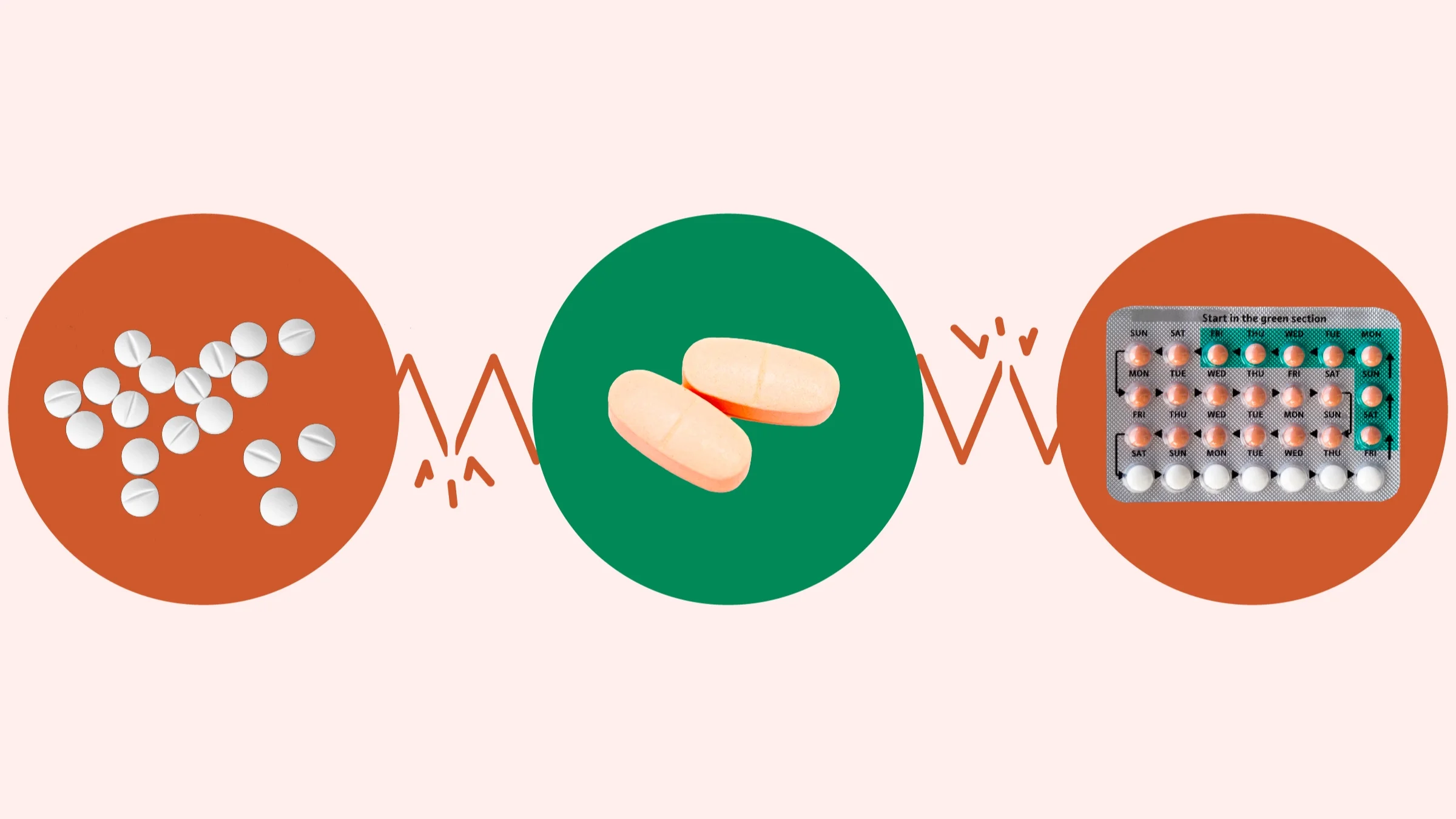Key takeaways:
Depakote (divalproex) is an anti-seizure medication that treats seizures and bipolar disorder. It’s also used to prevent migraine headaches.
Depakote interacts with many medications. This includes aspirin, estrogen-containing birth control pills, and warfarin. Certain antibiotics, antidepressants like amitriptyline, and other seizure medications can also interact with Depakote.
These drug interactions can make your medication less effective or worsen side effects. You may also need blood tests and dose adjustments more often when you’re taking Depakote with an interacting medication.
Save on related medications
Depakote (divalproex) is an anti-seizure (antiepileptic) medication that treats various types of seizures. It’s also an effective treatment option for bipolar disorder and migraine prevention. But Depakote also has a lot of drug interactions to consider when you’re taking it.
Below, we’ll discuss seven potential Depakote drug interactions. But keep in mind, this is not a complete list of all possible interactions. So it’s important to let your healthcare provider know about any medications you’re taking before starting Depakote.
1. Aspirin
Aspirin is an over-the-counter (OTC) medication that treats pain and fever. When taken with Depakote, aspirin may prevent the breakdown of Depakote in the body. This can lead to high Depakote levels and increase your risk of side effects.
It’s unclear how serious this interaction is. But if you’re taking Depakote, it’s best to talk to your healthcare provider before you take aspirin. Remember that some antacids and cold remedies may contain aspirin — so read labels carefully. Acetaminophen (Tylenol) or ibuprofen (Advil) may be a safer alternative.
This interaction may be more likely with higher doses of aspirin used to treat fever. Still, if you’re taking low-dose aspirin (81 mg) daily to help prevent blood clots, be sure to let your healthcare provider know. They may want to keep an eye on your Depakote levels or adjust your dose.
2. Estrogen-containing hormonal contraceptives
If your birth control contains estrogen, it can lower levels of Depakote in your body. This can make Depakote less effective.
If you’re already taking birth control when you start Depakote, let your healthcare provider know. And if you’d like to start or stop birth control while taking Depakote, be sure to talk to your healthcare provider first. They may need to adjust your Depakote dose to make sure your levels are just right.
3. Warfarin
Warfarin (Coumadin) is a blood thinner that’s used to treat and prevent blood clots. It requires regular blood tests to make sure the dose is within a safe and effective range. Warfarin also interacts with many medications, including Depakote. When you take warfarin with Depakote, it can lead to high warfarin levels, which can increase your risk of bleeding.
If you’re taking warfarin and Depakote, your healthcare provider may need to monitor your blood work more closely. They may also need to adjust your warfarin dose. Let your healthcare provider know right away if you notice any signs or symptoms of bleeding from warfarin. This includes unusual bruising, bleeding of the gums, or blood in your urine or stool.
4. Certain antidepressants
Amitriptyline and nortriptyline (Pamelor) are antidepressants that interact with Depakote. This drug interaction increases amitriptyline and nortriptyline levels in the body. As a result, you’re more likely to have side effects.
Let your healthcare provider know if you notice new or worsening side effects from your antidepressants. This may include more dizziness, drowsiness, or headache. You may need a lower dose of amitriptyline or nortriptyline while you’re taking Depakote.
5. Clonazepam and diazepam
Clonazepam (Klonopin) and diazepam (Valium) belong to the benzodiazepine drug class. They’re used to treat panic attacks, anxiety disorders, and seizures.
When you take Depakote with clonazepam, it can cause absence seizures, especially if you’ve experienced them in the past. Absence seizures don’t cause body movements the way other types of seizures do. They’re more likely to cause “staring spells,” or periods of unresponsiveness. It’s best to avoid this combination if you have a history of this type of seizure.
Depakote can also increase diazepam levels in the body, which can increase your risk of diazepam side effects. Let your healthcare provider know if you notice side effects such as sleepiness, confusion, or muscle weakness. You may need a lower diazepam dose.
6. Other seizure medications
Some people need more than one medication to control their seizures. And antiepileptics are well-known for having many drug interactions. So if you take more than one antiepileptic, you’ll want to consider possible interactions. The effects vary depending on the medications you take.
Here are some antiepileptics that can interact with Depakote:
Carbamazepine (Tegretol), phenytoin (Dilantin), and phenobarbital may lower Depakote levels, making it less effective. On the other hand, Depakote can also affect the levels of these medications. For example, it can increase phenobarbital levels when they’re taken together. This can cause serious side effects like confusion or difficulty breathing.
Felbamate (Felbatol) can raise Depakote levels and increase your risk of side effects.
Topiramate (Topamax) can cause high blood ammonia levels when combined with Depakote. This can lead to serious brain injury or a dangerous drop in body temperature. Symptoms may include weakness, vomiting, and confusion.
Lamotrigine (Lamictal) and ethosuximide (Zarontin) levels may increase if you take Depakote. This can raise your risk for side effects, including serious and life-threatening skin reactions with lamotrigine.
Simply put: if you’re taking Depakote with another antiepileptic, a drug interaction is possible. Your healthcare provider may ask you to do regular blood tests to make sure your individual combination of antiepileptics is safe. In some cases, your healthcare provider may need to adjust your medication regimen.
It’s important to stay on top of your healthcare appointments — regular monitoring can help identify and prevent interaction issues. And if you start a new antiepileptic and notice new or worsening side effects, be sure to let your provider know right away.
7. Certain antibiotics
Some antibiotics can interact with Depakote. This includes rifampin (Rifadin), an antibiotic that’s commonly used to treat tuberculosis (a bacterial infection of the lungs). It also includes intravenous carbapenem antibiotics. These antibiotics are used most often in a hospital setting to treat complicated bacterial infections. Examples include ertapenem (Invanz) and meropenem (Merrem).
When combined with Depakote, each of these antibiotics can significantly lower Depakote levels. This can make Depakote less effective.
Your healthcare provider will likely monitor your Depakote levels if you start to take one of these antibiotics. Still, let your healthcare provider know if you start one of these antibiotics and notice Depakote isn’t working as well as it should. This may include the return of seizures, headaches, or worsening mental health symptoms.
When should I contact my healthcare provider about a Depakote interaction?
Talk to your healthcare provider before you start or stop taking any medication while you’re taking Depakote. They may need to adjust your dose or monitor you more closely to make sure your treatment is safe and effective.
If you notice any new or worsening side effects while taking Depakote, let your provider know.. This includes signs that Depakote isn’t working as well as it should. This may include the return of seizures, migraines, or bipolar symptoms like depression or mania.
In rare cases, you may experience more serious interaction symptoms. These may include skin reactions, confusion, or difficulty breathing. Seek medical care right away if you notice these symptoms.
The best way to avoid potential drug interactions is to keep a medication list, and update it regularly. This helps your healthcare team check to make sure your medications are safe to take together.
The bottom line
Depakote is an effective antiepileptic that can interact with many medications. This includes aspirin, estrogen-containing birth control pills, and warfarin. Certain antibiotics, antidepressants like amitriptyline, and other seizure medications can also interact with Depakote. Let your healthcare provider know before starting or stopping a new medication if you’re taking Depakote.

Why trust our experts?



References
Albuja, A. C., et al. (2022). Absence seizure. StatPearls.
National Institute on Drug Abuse. (2018). Prescription CNS depressants DrugFacts.
Papp-Wallace, K. M., et al. (2011). Carbapenems: Past, present, and future. Antimicrobial Agents and Chemotherapy.
Perucca, E. (2005). Clinically relevant drug interactions with antiepileptic drugs. British Journal of Clinical Pharmacology.
Preferred Pharmaceuticals, Inc. (2023). Divalproex sodium [package insert].














